6 Healthiest Frozen Pot Pies on Grocery Shelves—and 4 To Avoid
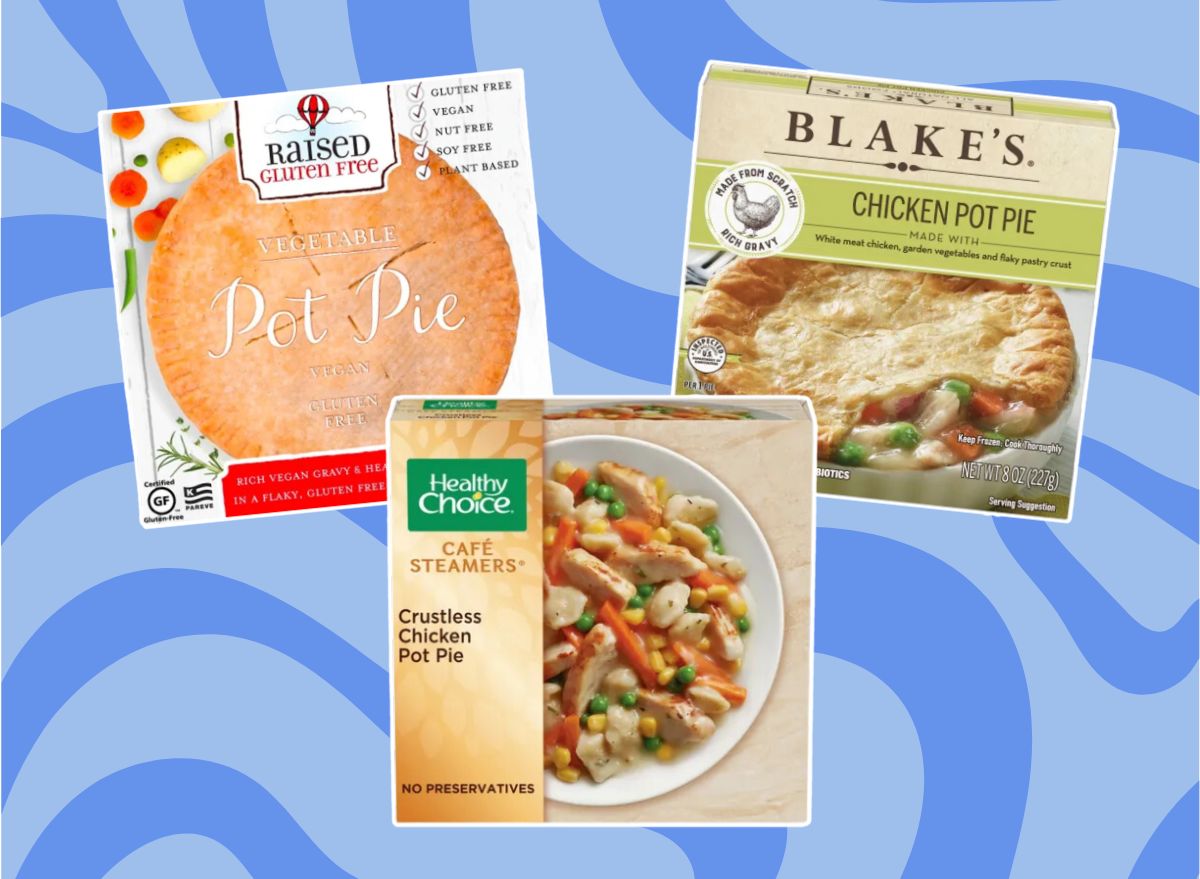
Pot pie has seen many transformations over the years, evolving from Medieval meat pies to the savory dinnertime staple of the 19th century that we know and love today. With the dawn of the microwave oven, frozen pot pie TV dinners took the grocery store by storm, enabling consumers all across the country to enjoy this delicious comfort food without the hours-long preparation needed previously. Frozen pot pies, no matter if they're stuffed with chicken, veggies, sausage (or all the above), can be the perfect solution to a family-friendly dinner time during those hectic weeknights when you find yourself without much time to start baking from scratch. However, is it possible to find healthy frozen pot pies that meet your nutritional needs and taste delicious at the same time?
Like all frozen foods, certain pot pie brands have filled their crusts with highly processed, nutrient-devoid ingredients that stray far from the humble beginnings of this favorite American dish. Many brands, especially mainstream, mass-produced brands, can contain high levels of sodium, saturated fat, and even added sugars, which can eclipse the nutritional benefits of pot pie's abundance of veggies and lean proteins.
However, it's hard to decide which brands are worth your time and money, especially when you're trying to zip in and out of the grocery store. Many brands will claim to be "healthy" due to their organic status, vegan-friendly ingredients, or even because of their low carbohydrates that play into different fad diets. However, just because something is labeled "healthy" doesn't mean that the nutrition label matches. That's where we come in. We've rounded up six of the healthiest, highest-quality pot pies on grocery store shelves and also noted four frozen pot pies that you may want to stay away from to make your weeknight dinners a breeze.
How We Chose the Healthiest Frozen Pot Pies:
- Low in sodium: Frozen, highly processed foods—pot pies included—often contain high amounts of sodium in an effort to get consumers hooked and, moreover, to enhance any flavors that are potentially lost in the freezing process. Not all pot pies are made equally in this respect, and many better-for-you brands are keeping sodium levels moderate in an effort to promote heart health. Sodium doesn't affect calorie counts, therefore it's often overlooked by those trying to "eat healthy." However, Americans are eating an average of 3,500 milligrams of sodium per day when the ultimate goal is 2,300 milligrams or less. To make the buying process easier, we chose pot pies that contain approximately 600 milligrams of sodium or less—not even half of your daily limit.
- Little to no added sugar: Believe it or not, pot pie can contain lots of added sugar. These hidden sugars often crop up in the flakey crust or in the gravy that makes pot pie such a popular dinner staple. Sugar, due to the brain's reward system, can feel addictive—and, unfortunately, added sugars are found in almost everything. Because of sugar's ubiquity, Americans are eating upwards of 17 teaspoons of added sugar per day which is a whopping 2-3 times more than the daily recommended levels set forth by the American Heart Association. To make sure that you're consuming only the healthiest pot pies, each of our "best" options contains only 2 grams or less of added sugar per serving.
- Relatively low in saturated fat: Saturated fat is a natural occurrence in pot pies which contain ingredients such as milks to thicken the gravy and butter to make that flakey, pull-apart crust. Saturated fats, like sodium or sugar, are all nutrients that, when eaten in moderation, are a-okay—after all, they're what make food delicious. However, saturated fat (again, like sugar and sodium) is being eaten in excess. Even vegan pot pie options can contain high levels of saturated fat. To keep you well under the daily limit of 13 grams per day (11 grams for those watching their cholesterol levels), we ensured that all of our "best" options contained 8 grams or less of saturated fat per serving.
Read on to see the healthiest frozen pot pies available on grocery shelves and a few that we recommend skipping. Then check out the 25 Healthiest Frozen Meals.
6 Healthiest Frozen Pot Pies
Best: Blake's Chicken Pot Pie
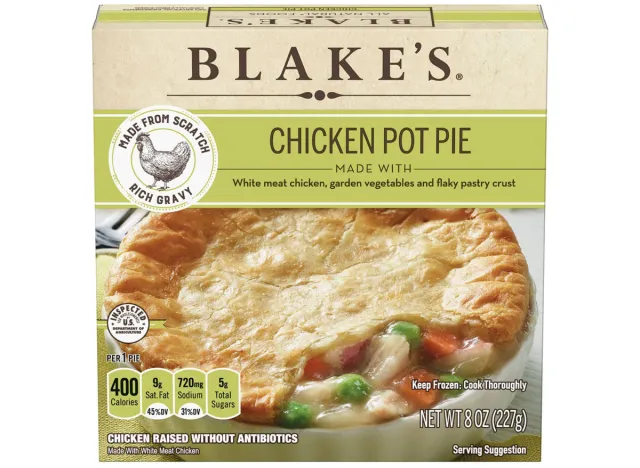
Calories: 340
Fat: 17 g (Saturated Fat: 8 g)
Sodium: 470 mg
Carbs: 34 g (Fiber: 5g, Sugar: 1 g)
Protein: 15 g
Blake's Chicken Pot Pie is made from scratch (no machines here!) with wholesome, easy-to-read ingredients. There's nothing on the ingredients list that will leave you wondering about what, exactly, you're putting in your body, and this pot pie also contains only 340 calories per cup—a much lower figure than many other brands on the market. Additionally, each serving contains 15 grams of protein—an important nutrient for satiety—and contains only 1 gram of added sugar. As a bonus, this chicken pot pie is filled with hearty vegetables such as peas and carrots to up the nutrition content even more.
Best: Raised Vegan Pot Pie
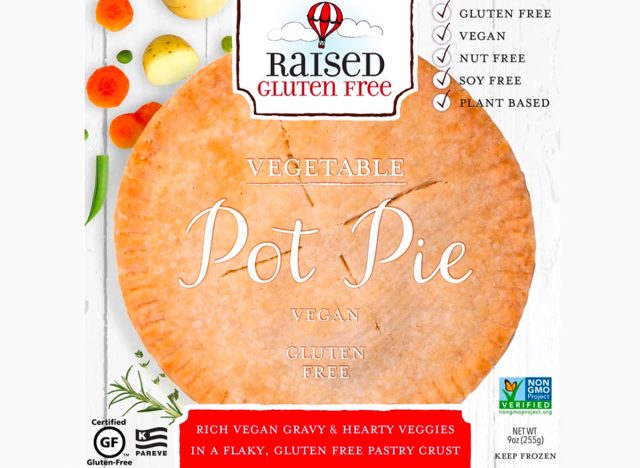
Calories: 530
Fat: 30 g (Saturated Fat: 8 g)
Sodium: 610 mg
Carbs: 58 g (Fiber: 3 g, Sugar: 5 g)
Protein: 5 g
If you follow a vegan lifestyle (or if you're just not in the mood for meat), Raised Vegan Pot Pie offers all the deliciousness of this classic comfort food without the use of animal products. This pot pie contains a medley of veggies, including potatoes, carrots, green beans, peas, and onion, and there's no skimping on flavor here as Raised adds an abundance of herbs and spices to zest up this classic. It's important to remember that not all foods are healthy just because they're vegan. However, this pot pie boasts moderate sodium levels, low added sugar, and even 5 grams of protein to help keep you full until your next meal.
Best: HMR Crustless Chicken Pot Pie
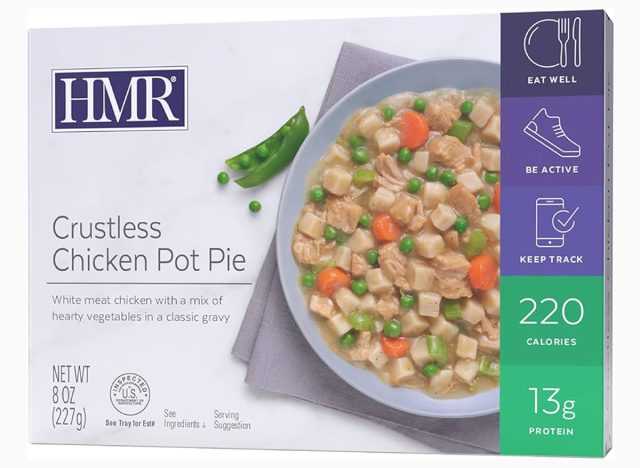
Calories: 220
Fat: 9 g (Saturated Fat: 2.5 g)
Sodium: 590 mg
Carbs: 21 g (Fiber: 3 g, Sugar: 2 g)
Protein: 13 g
For those of us who are watching both calorie and carbohydrate counts, HMR Crustless Chicken Pot Pie may be a good fit for a quick weekday dinner. One tray of this pot pie contains only 220 calories and half the "normal" amount of carbohydrates found in mainstream pot pies, which can climb to 40 grams and up. Especially for those who are counting their carbs, this is a feature worth mentioning. The 3 grams of fiber is a noteworthy feature as well, as this nutrient may help promote satiety and gut health.
Best: Healthy Choice Crustless Pot Pie
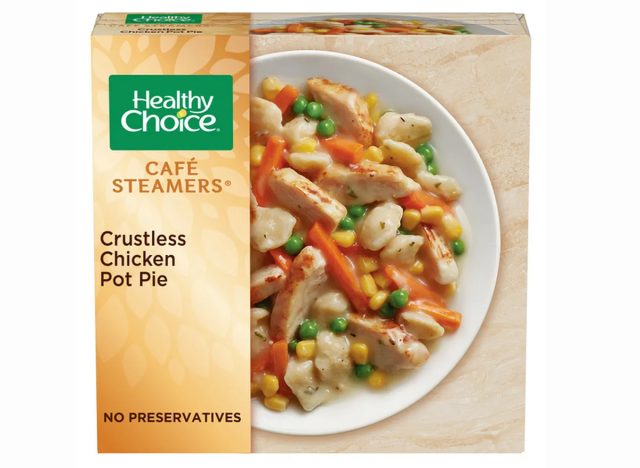
Calories: 300
Fat: 6 g (Saturated Fat: 2 g)
Sodium: 600 mg
Carbs: 40 g (Fiber: 3g, Sugar: 6 g)
Protein: 2 1g
With only 300 calories, 2 grams of saturated fat, and moderate sodium counts, this Healthy Choice Crustless Pot Pie is a delicious way to indulge in that wholesome chicken pot pie taste without sacrificing health goals. As this chicken pot pie is crustless, the nutrition label contains less than one gram of added sugar. Added sugars contain no nutritional value (such as fiber, which is found in naturally occurring sugars and may help slow the rate of digestion). Excessive intake of added sugars can lead to the development of chronic illnesses such as obesity, type-2 diabetes, and even cardiovascular disease.
Best: Katz Garden Vegetable Pot Pie
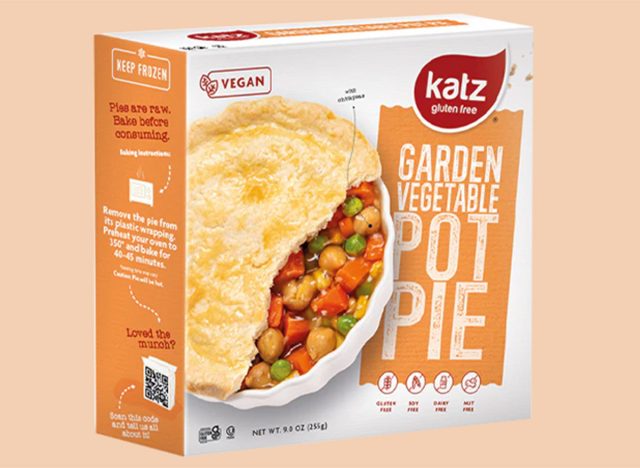
Calories: 350
Fat: 18 g (Saturated Fat: 8 g)
Sodium: 560 mg
Carbs: 45 g (Fiber: 5 g, Sugar: 6 g)
Protein: 4 g
Katz Garden's Vegetable Pot Pie is a delicious gluten-free option for those with sensitive tummies or Celiacs who still want to indulge in their favorite comfort food. This gluten-free pie is made with a medley of veggies, including cauliflower, carrots, peas, and corn—and, as this pot pie contains no dairy or eggs, this meal is suitable for vegans. Of course, just because a food is gluten-free and vegan doesn't automatically make it healthy. This specific pot pie, though, contains only 2 grams of added sugar, less than 400 calories, and is relatively lower in saturated fat compared to those on our "worst" list.
Best: Boomerang's Chicken Classic
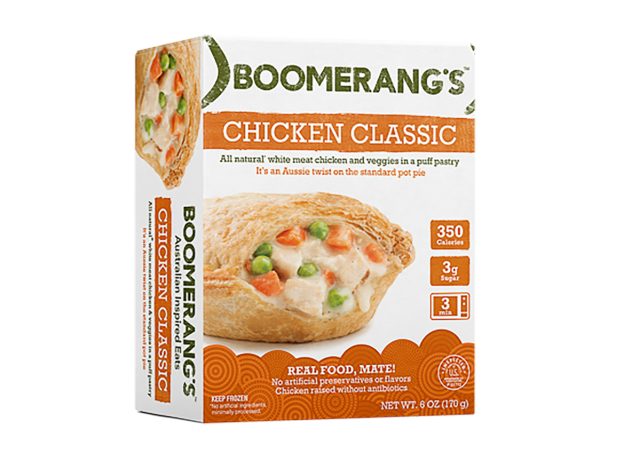
Calories: 350
Fat: 14 g (Saturated Fat: 7 g)
Sodium: 460 mg
Carbs: 44 g (Fiber: 2 g, Sugar: 3 g)
Protein: 12 g
One of these hand-held pies—or Boomerangs, that is—provides an Aussie spin on an American classic. This 350-calorie personal pie is perfect for on-the-go meals and contains lower saturated fat counts, 0 grams of added sugar, and 12 grams of protein to help keep you full until your next meal. Boomerang pies are also made with chicken raised without antibiotics and contain no artificial flavors or preservatives to maintain a high-quality status.
4 Unhealthiest Frozen Pot Pies
Worst: Marie Callender's Chicken Pot Pie
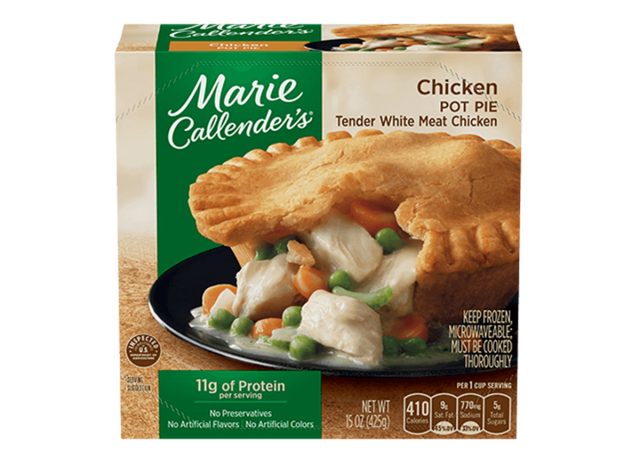
Calories: 440
Fat: 26 g (Saturated Fat: 11 g)
Sodium: 650mg
Carbs: 40 g (Fiber: 2 g, Sugar: 2 g)
Protein: 11 g
At first glance, Marie Callender's Chicken Pot Pie may not appear to be wholly unhealthy. However, one cup of this pot pie contains 11 grams of saturated fat—almost 84% of your daily saturated fat limit of 13 grams, as recommended by the American Heart Association. Additionally, this pot pie contains dubious ingredients such as the ominous term "flavoring," which doesn't mention its origins or whether or not it's derived from natural or artificial sources. Although these flavorings may not be unhealthy in the traditional sense, we don't see the point in adding untraceable flavors when better-for-you brands are doing without.
Worst: Banquet Sausage Pot Pie
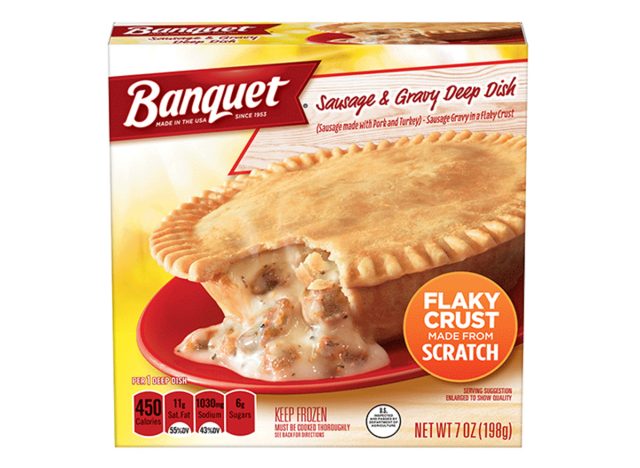
Calories: 420
Fat: 28 g (Saturated Fat: 11 g)
Sodium: 890 mg
Carbs: 35 g (Fiber: 1 g, Sugar: 4 g)
Protein: 8 g
Besides the 11 grams of saturated fat, the Banquet Sausage Pot Pie contains a whopping 890 milligrams of sodium—an egregious amount for any pot pie. Trusted medical groups, including the American Heart Association, recommend no more than 2,300 milligrams a day with an ultimate goal of 1,500 milligrams. One of these deep-dish pot pies is almost 40% of your daily sodium needs. While this may seem like no big deal, this pot pie is only one out of your three daily meals, not including snacks—sodium is a silent nutrient that can add up fast.
Worst: Atkins Crustless Chicken Pot Pie
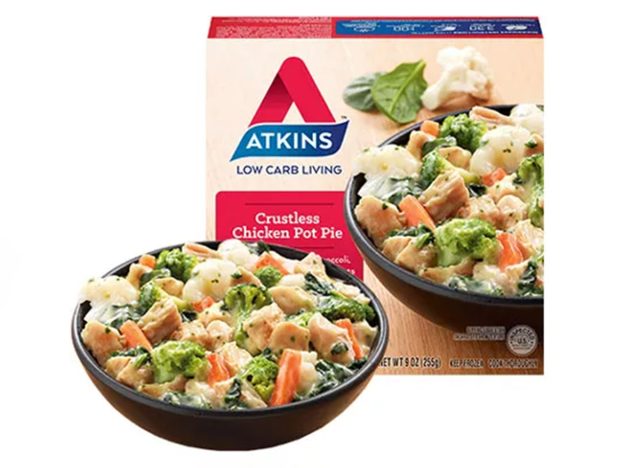
Calories: 300
Fat: 19 g (Saturated Fat: 6 g)
Sodium: 920 mg
Carbs: 9 g (Fiber: 3 g, Sugar: 3 g)
Protein: 24 g
The Atkins company, whose low-carb, high-protein diet skyrocketed in the early 2000s, produces a line of frozen foods that are meant to aid in weight loss. Unfortunately, Atkins' Crustless Chicken Pot Pie contains an egregious amount of sodium at 920 milligrams per serving. Certain studies have shown that excess sodium intake may lead to greater waist circumference, and it's no secret that sodium can lead to cardiovascular disease. And the 6 grams of saturated fat doesn't impress us either—the lower the better! In our opinion, it may be a good idea to give this pot pie a wide berth.
Worst: Bettergoods Pot Pie
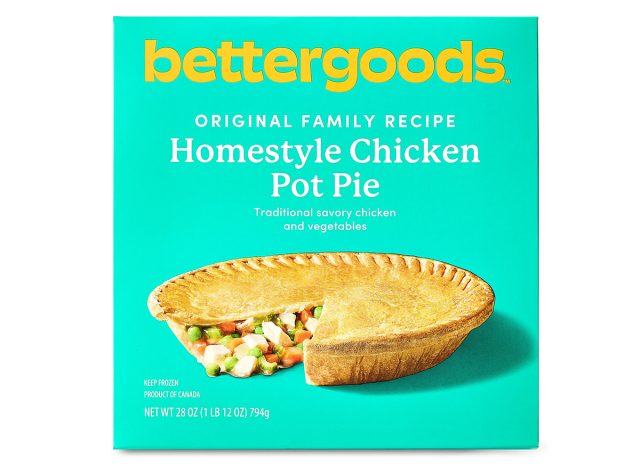
Calories: 550
Fat: 36 g (Saturated Fat: 11 g)
Sodium: 510 mg
Carbs: 45 g (Fiber: 1 g, Sugar: 2 g)
Protein: 12 g
With 11 grams of saturated fat, Bettergoods Pot Pie is one that should best be avoided. Saturated fats are, at base levels, fats that solidify at room temperature. Although the medical community is still debating the breadth of saturated fat's role in the development of chronic diseases, many contemporary studies still note that lowering saturated fat intake is associated with increased health, specifically cardiovascular health. If you're concerned about your current cholesterol levels, the American Heart Association's recommended daily limit of 13 grams of saturated fat lowers to 11 grams for optimal health outcomes.
- Source: https://www.ncbi.nlm.nih.gov/pmc/articles/PMC4179173/#:~:text=Such%20an%20approach%20is%20a,the%20category%20of%20breakfast%20cereals.
- Source: https://www.dietaryguidelines.gov/node/373
- Source: https://www.ncbi.nlm.nih.gov/pmc/articles/PMC4785287/
- Source: https://www.heart.org/en/healthy-living/healthy-eating/eat-smart/sodium/how-much-sodium-should-i-eat-per-day
- Source: https://www.ncbi.nlm.nih.gov/pmc/articles/PMC8468293/
- Source: https://www.heart.org/en/healthy-living/healthy-eating/eat-smart/sugar/how-much-sugar-is-too-much
- Source: https://www.heart.org/en/healthy-living/healthy-eating/eat-smart/fats/saturated-fats
- Source: https://pubmed.ncbi.nlm.nih.gov/18282589/
- Source: https://www.ncbi.nlm.nih.gov/pmc/articles/PMC9268622/
- Source: https://www.ncbi.nlm.nih.gov/pmc/articles/PMC5133084/
- Source: https://www.heart.org/en/healthy-living/healthy-eating/eat-smart/fats/saturated-fats
- Source: https://www.heart.org/en/healthy-living/healthy-eating/eat-smart/sodium/how-much-sodium-should-i-eat-per-day
- Source: https://www.ncbi.nlm.nih.gov/pmc/articles/PMC10042719/#:~:text=Higher%20sodium%20intake%20was%20significantly,in%20one%20study%20%5B29%5D.
- Source: https://www.ncbi.nlm.nih.gov/pmc/articles/PMC8470268/
- Source: https://pubmed.ncbi.nlm.nih.gov/34649831/
- Source: https://www.heart.org/en/health-topics/cholesterol/prevention-and-treatment-of-high-cholesterol-hyperlipidemia/the-skinny-on-fats









